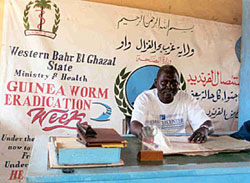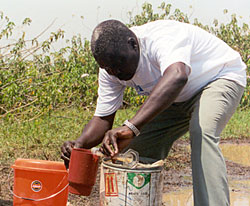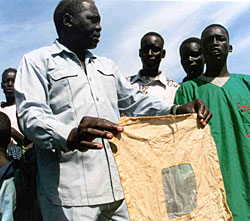Ermino Emilio cannot stop the war that has plagued his country for decades, but he can help people in his region of southern Sudan by protecting them from the further torment of Guinea worm disease. Ermino is the Carter Center's regional coordinator for fighting that disease in Sudan's Bahr el Ghazal Zone, a zone fragmented by the two main warring parties in Sudan.
The reasons for fighting are highly complicated. Today the conflict is primarily between the Sudan People's Liberation Movement/Army (SPLM), the major rebel faction operating in the south, and the Government of Sudan. While power and wealth-sharing are at the core of the conflict, disagreement over the proper role of religion in Sudan and the right to self-determination for the south also are key issues. However bleak the situation may seem, for more than a decade, President Carter and The Carter Center have worked to restore hope in Sudan through peace and health initiatives on all sides of the conflict.
More than three of every four of the world's remaining cases of Guinea worm exist in southern Sudan. Ermino, at 58 years of age, would love to be part of the final team responsible for completely eliminating the disease. The continuing war, however, limits the work of his volunteer staff to areas proximate to the Government of Sudan garrison city of Wau, his region's principal city.
"I pray that I live long enough to see the ugly faces of Guinea worm victims turn to happy, healthy faces."
--Ermino Emilio, Carter Center Regional Coordinator, Guinea Worm Eradication Program
"I know people outside Wau are suffering from Guinea worm disease," he says, "but we cannot go where the army doesn't go." Where Ermino is working, staff members must travel with army convoys to spend as much time as possible educating people about how to protect themselves from Guinea worm, treat it and distribute household and pipe filters, which are worn around the neck to permit safe drinking of available water.
Without military escort, Ermino's staff don't travel more than five miles outside Wau, and then only in pairs. His predecessor was killed outside of town in 1998. Ermino joined the Guinea worm program two years earlier. As a career public health officer, he was well qualified to take over regional coordinator duties.
"Wau was a beautiful town before the war," he recalls wistfully. "We had a piped and treated water system, electricity 24 hours, and a cinema. There were big homes (on the outskirts), which became destroyed.
"We used to fly in UNICEF planes to supervise our stations in other states. Now, UNICEF partners with us by installing hand pumps to seal off and protect well water. Indigenous transmission of Guinea worm in town is very rare because of safe water, but we have to watch transmission from the influx of people displaced from outside town."
Ermino is proud to be working with the Ministry of Health and The Carter Center team of people in Sudan fighting not only Guinea worm but also river blindness and trachoma. He's also proud of his colleagues fighting these same diseases on other sides of the conflict. However, the challenges to complete his work frustrate him.
"War increases disease and hunger," he points out. "Hunger and stress cause people to neglect their health. It is discouraging to hear people complain that we didn't bring them food when we came to educate them about Guinea worm.
"The WFB (World Food Bank) brings some food. We want to produce our own, but it isn't safe to work in the fields. We say food tastes better when it comes from your own sweat."
War wears away resistance to disease in more ways than one. "Health is mental and physical well-being," Ermino says, "not merely absence of disease. When people are mentally fit, they tend to be physically healthy also."
Ermino is grateful for The Carter Center's efforts to restore peace, which is essential to carrying out his work. "I pray that I live long enough," he says, "to see the ugly faces of Guinea worm victims turn to happy, healthy faces."
Read more about the Guinea Worm Eradication Program and the Carter Center's work in Sudan.

Photos by Emily Howard
Ermino Emilio, seated in front of a Guinea Worm Eradication Week banner, fights the disease in Sudan's Bahr el Ghazal Zone.

Ermino mixes a pitcher of ABATE®, a larvacide used to kill water fleas in stagnant pools--often the sole source of water in remote villages.

Ermino demonstrates the use of a Guinea worm cloth filter.
Please sign up below for important news about the work of The Carter Center and special event invitations.